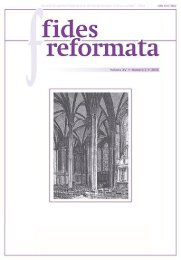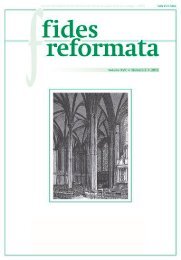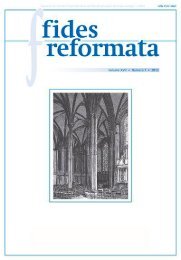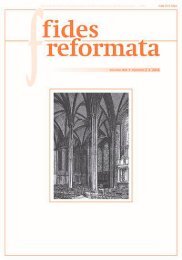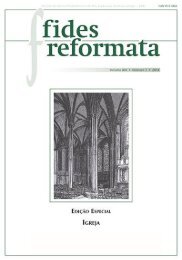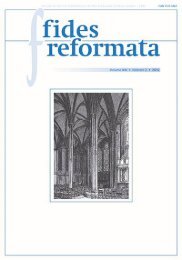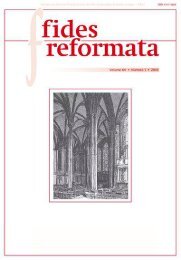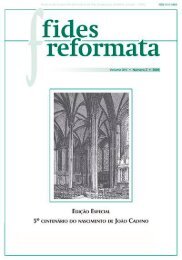Fides 18 N2 - Revista do Centro Presbiteriano Andrew Jumper
Revista Fides Reformata 18 N2 (2013)
Revista Fides Reformata 18 N2 (2013)
You also want an ePaper? Increase the reach of your titles
YUMPU automatically turns print PDFs into web optimized ePapers that Google loves.
FIDES REFORMATA XVIIi, Nº 2 (2013): 99-115<br />
described as a purchase. 19 In order to highlight this works principle, man’s<br />
original relationship to God is sometimes conceived of as having been only<br />
that of a servant. It is supposed that through his obedience he was to earn the<br />
right to sonship and be made heir to eternal life. 20 Although children of God<br />
are also his servants, this construction is problematic. Scripture suggests that<br />
Adam had the status of sonship from the beginning (Luke 3:38) and there is<br />
no principle that teaches that a servant’s work entitles him to sonship when<br />
faithfully completed.<br />
Throughout this study difficulties have been raised with regard to conceiving<br />
of original righteousness as a job to be performed and as meritorious<br />
of wages. Genesis 1 and 2 suggest another picture for the original eschatology.<br />
After the fall redemption stands in the forefront because the train must be<br />
restored after the wreck before it can continue on its way. Avoiding train wrecks<br />
is of first importance, but it is not the principal purpose of the train and its<br />
trip. Similarly, remaining righteous was absolutely essential for Adam, but it<br />
was not what he was created for and not the raison d’être of history. Rather,<br />
mankind’s eschatological calling centered on the cultural mandate.<br />
Adam and Eve and their descendants, as God’s image and likeness, were<br />
called to glorify him by filling the earth and subduing it. We may understand<br />
that they were to fill the earth so that it would teem with image-bearers who<br />
would transform all of it into a garden (Gen 2:15) and, perhaps, a great city<br />
(Heb 11:10). When this historical work was completed they would be granted<br />
to enter into God’s eternal rest (Heb 4:10). Would it then be the fulfillment of<br />
the cultural mandate that would earn the eternal reward as wages? It could be.<br />
Maybe the Lord did condescend to give the reward on the basis of the principle<br />
that a laborer deserves his wages. If so, this work would by no means<br />
have excluded grace and faith and the reward would not have been based on<br />
justification. Nevertheless, another picture seems more appropriate.<br />
Jesus speaks of both reward for our work and of inheritance. He says<br />
that those who tell people about Christ and bring them to him receive fruit for<br />
eternal life (John 4:36). He also says we are to labor for the food that endures<br />
to eternal life (John 6:27). More often, however, in the Bible, eternal life is said to<br />
be an inheritance (Matt 5:5; 19:29; 25:34; Titus 3:7). Labor and inheritance<br />
can be brought together by regarding entitlement as based on sonship. Adam<br />
19 Hodge, Systematic Theology, Vol. III, p. 164, writes, “Heaven is always represented as a<br />
purchased possession.” The Westminster Confession of Faith (8, 4-5) confesses that Christ purchased<br />
an everlasting inheritance.<br />
20 Cf., e.g., Dabney, Lectures in Systematic Theology, p. 302, “... a reward for the probationary<br />
obedience was promised, which, while a reward for right works, was far more liberal than the works<br />
entitled to; and this was an a<strong>do</strong>ption of life, transferring man from the position of a servant to that of a<br />
son, and surrounding him forever with the safeguards of the divine wis<strong>do</strong>m and faithfulness, making<br />
his holiness indefectible.”<br />
113





